The great ancient Greek philosophers
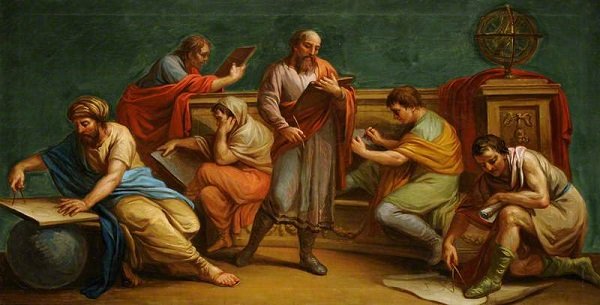
"A Greek Philosopher and His Disciples", Antonio Zucchi
Ancient philosophy is a period of philosophy history that spans about a millennium, from the 6th century BC. until the end of the 4th century. When it comes to ancient philosophy, it is usually about Western Christian philosophical tradition, which does not mean, however, that Eastern philosophical schools did not exist in Antiquity. Ancient philosophy is considered to be the beginning of philosophical science at all, and therefore it is mostly associated with ancient Greek philosophy.
Socrates
Socrates is an ancient Greek philosopher, one of the most important symbols of Western philosophical tradition. Through inquiries and questioning, he creates a new branch of philosophy, which until then has been limited by the theories of nature concerning morals and moral education. This new "genre" in philosophical science is called "ethics" (from ethos: the characteristic of the individual, what distinguishes him from others and gives him individual traits). For Socrates, moral development was the most important human task. For him, philosophy was not just a bunch of teachings and dogmas, but a way of life. Living according to his philosophical principles, Socrates did not have time to live "for himself", he refused to take money for his teaching.
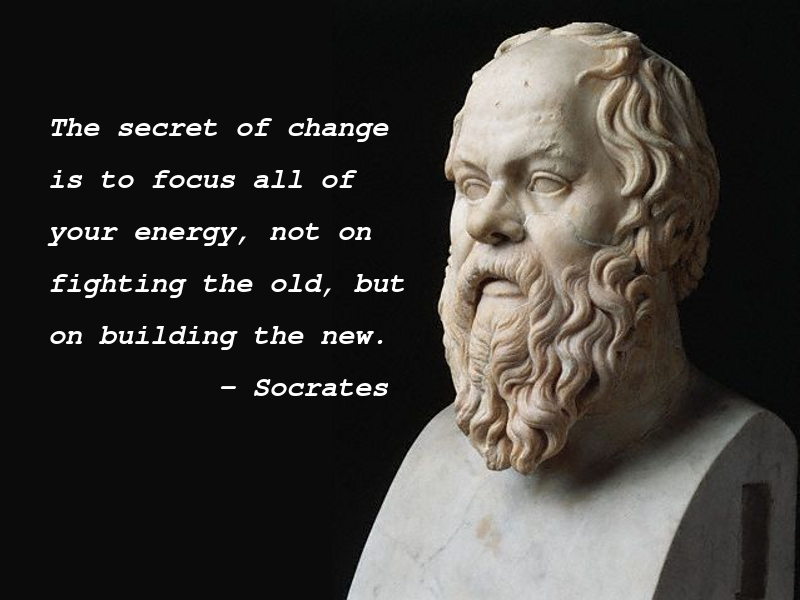
Socrates was born in Athens, in Alopeke. His father, Sophronisk was a sculptor and his mother, Fenareta, a midwife. As a young Socrates he had a close relationship with the philosopher Anaxagor, but his philosophy was influenced by his perceptions only to the extent that Socrates did not take into account the influence of the gods in human life but believed that man was the one who made his life. Socrates was engaged in sculpture in his youth, and was invited by Fidias to sculpt the three charities of the Acropolis, which at that time was being built again after his destruction. This is the time of the impressive cultural, intellectual and political upsurge of Athens, which has flourished under the rule of Pericles, a great strategist and champion of polis development. Socrates lives with a sense of belonging to Athens and the Athenian people and spends his life in constant contact with the polis and the people in it. Wondering about Xanthi, who is said to be a wicked and damn woman, but having in mind that Socrates has not earned money (he never took money for his conversations) nor contributed to the material well-being of your family, no wonder Xanthia was often angry! At the time of Socrates in Athens, sophists, the so-called "philosophy teachers", for whom there is no absolute truth, everything is subjective, and every situation can be as successful as the opposite. This relativisation of the truth did not suit Socrates, who firmly believed in her ignorance and the attempts of the Sophists to turn every lie into truth, and to distort any truth, had been a violation of man's moral persistence. Socrates had frequent disputes with them (which ultimately ended with his death) in which he applied his so-called. "Maevist art". Socratic's Mafia is a kind of "acupuncture at the birth of the truth." In keeping with his maxim, "I know that I do not know anything," he asks questions whose answers lead to new questions and dialectically reaches situations that can not be denied. In this way, he primarily seeks to show to his interlocutor not so much the veracity of his allegations (he actually did not express any opinion, he knows nothing), but rather the insolvency of the stubborn and insubstantial insistence of position . He wanted to show that truth can be born dialectically, by walking through all situations that can lead or not lead to it.
At the end of his life, Socrates is too embittered by the political events and the rule of Athens, which is in the hands of the oligarchs after Pericles' death (who died of the plague) and Alcibiad (Pericles nephew murdered by conspirators in Thrace), but stops walking around the streets of his native polis and talking to his friends and everyone he meets. Because of the great influence he has over young people and his differences with the views of the ruling Socrates, he is an inconvenient figure that can undermine the prestige of the rulers, and therefore against him they are bringing a lawsuit accusing him of devastating youth and introducing new gods. His proximity to young people is interpreted as a disgrace, and the new gods are interpretations of the Socratic "Daimonion," which in his words always obstructs him when he is about to err. This "daimonion" of Socrates is his conscience that stops him from immoral and erroneous actions. Socrates himself has always argued that the one who does evil does not know what is good, that is, if one knows what is good, he will do well. Socrates fails to prove his innocence to the process and is condemned to death by poisoning! Despite his friends' attempts to make him run into another polis (and they are regulating his escape!), He remains firmly in his position that if he does so, he will make his whole life go, for it would mean giving up everything he said, in which he believed in unconditional truth. Socrates dies, drinking a cup of poison (kiwi or hemlock). He did not leave any written work, he preferred the conversation. For him we have testimonies only by his contemporaries and followers: Plato in his "Dialogues," where Socrates is the main character, Xenophont, Aristophan in the comedy "Clouds", where Socrates is contemplated as a typical sophist. I know that I don' t know anything (in ancient Greek: in the case that they are in Latin: scio me nihil scire or scio me nescire) is the winged phrase attributed to Socrates. Some have attributed Democritus' thought. She has many paraphrases. In the course of time it became a popular saying derived from Plato's stories of the Greek philosopher Socrates. This proverb is also related to the contemporary Socrates response to the question "Who is the wisest man in Greece?".
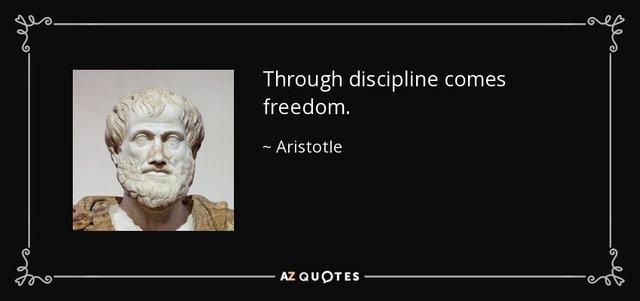
Aristotle
Aristotle is an ancient Greek philosopher, one of the greatest geniuses of ancient times, born in Stagira, who died in the Euboea city of Halkida. Son of Nichocham, the doctor of the Macedonian king, Aristotle became a mentor and friend of Alexander the Great. After listening to Plato's lessons for 20 years, he founded the famous Lycaean school in Athens. Aristotle is one of the few personalities in history to explore almost every topic available for his era. In science he studies anatomy, astronomy, geography, geology, zoology, meteorology and physics. In philosophy he writes about aesthetics, ethics, economics, metaphysics, politics, psychology, rhetoric, theology and government. He also deals with education, foreign customs, literature and poetry. His writings are in fact an encyclopedia of ancient Greek knowledge. Aristotle is the creator of logic. In his composition, First Analyst, he developed the first theory of formal-valid mindset. Further in the tradition, his logical manuscripts have been united in the so-called 'Organon', along with First Analyst of particular importance for the development of logic, were Categories (a brief composition which was conceived as the Aristotelian teaching of the concept) and About Interpretation (a brief work that was conceived as the Aristotelian teaching of reasoning) . He is the author of the books "Animal History", "Rittorika", "Politics", "Meteorology", "Nicomacha Ethics" and "For the Soul", as well as many others.
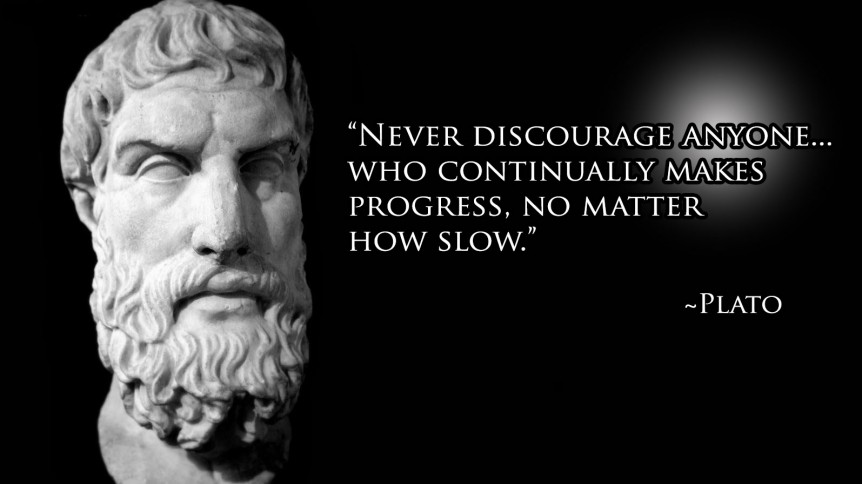
Plato
Plato is a celebrated ancient Greek philosopher who is a student of Socrates and a teacher of Aristotle. Founder of the Athens Academy. Plato, who is believed to be a philologist, has long taught at the Academy, but has also written many philosophical questions. Plato was born. 427 BC. Aegina, south of Attica. It comes from the royal priestly family of the Codrids and the great Athenian legislator Solon. His first steps in philosophy are carried out under the influence of the Heraclitus teachings. From the Heraclitus-Kraftus follower, he becomes familiar with dialectics. his formation as a philosopher represents the teachings of Socrates. In 407 BC. Plato joined the circle of the famous Athenian dialectician and for 8 years he listened to his lectures. After Socrates' death for 12 years he traveled through a number of areas of the then civilized world. He spends some time in Megara where Euclid is working. He stays longer in Egypt, where he meets the Egyptian society's caste structure, the organization of the priesthood and the scientific achievements of this country. His stay in southern Italy, where he meets Pythagorean teachings and is drunk to influence on the political life in Syracuse. This experience proved to be unsuccessful. In 387, Plato returned to Athens and founded the Academy. He then took two more trips to Sicily, ending unsuccessfully. He remains at the end of his life in Athens, devoted entirely to the work of the Academy and the problems of philosophy and science.
His ideas reach us through recorded philosophical and dramatic works that are kept in manuscripts, restored and edited many times (as translated) from the beginning of humanism. Plato's legacy consists mostly of dialogues, epigrams, and letters. All known Plato's dialogues have survived to date, but today's editions of his works consist of dialogues considered by most scientists to be unexpected (eg Alcibiades, Ketophon) or seemingly plausible (eg, Demodoc or Second Alkyviad). The famous moon crater Plato was named in his honor. Plato's father is Ariston, and his mother is Pericion. Glaukon, one of Plato's distant relatives, was a well-known Athenian nobleman. Plato's real name is Aristocle. Since "platinum" means "wide", the nickname may refer either to the physical appearance or to the style / position in the fight. Plato is a teacher of Aristotle and Theophrastus. Plato became a student of Socrates in his youth years. Rests approx. 347 BC during a wedding celebration in Athens.
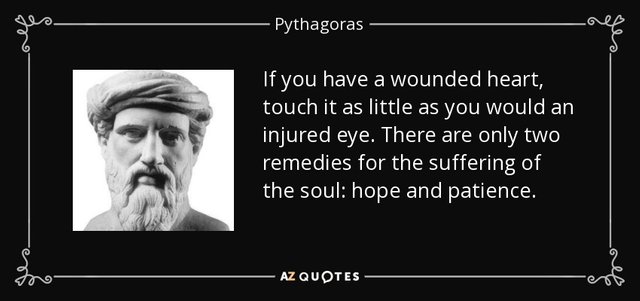
Pythagoras
Pythagoras is an ancient Greek mathematician and philosopher, creator of the Pythagorean religious-philosophical school. Pythagoras' biography can hardly separate from the legends that portray him as a demigod and miracle worker, devoted to all the secrets of the Greeks and the barbarians. Herodotus called him "the greatest of the wise men in Hellas". The main sources of Pythagoras' life and doctrine are the works that come to us: Yamblych (242-306), Porphyrius (234-305), and Diogenes Laerts (200-250). These authors are based on earlier authors, including the student of Aristotle, Aristocene (370-300 BC). In fact, the earliest sources of Pythagoras were written 200 years after his death, and are based on the work of his disciples, who are not always impartial. He was born and lived on the island of Samos. His father is the Phoenician merchant from Tir - Mensarh, a man of noble origin and good education. His mother is Pitais from the Greek island of Samos. As a young man, he trains at the Memphis priests in Egypt in the Phoenician temples of Tire and Bibl, perhaps in Babylon. There he mastered many of the scientific and religious achievements of Eastern cultures (including the so-called Pythagorean Theorem), which introduces into Greek science, philosophy and religion. Running from the self-styled tyrant Polycrat, Pythagoras moved to Croton, southern Italy, around 531 BC, where he found many supporters. It has attracted not only his philosophical teachings, which he convincingly exposes, but also the way of life recommended by him with elements of asceticism and strict morals. Pythagoras preaches moral upbringing of uneducated and full subordination to the class of wise and knowledgeable people. His disciples form a brotherhood of the initiates and deify their teacher. This school existed in Croton until the end of the 6th century BC, when opponents of the Pythagoreans forced the scholars to move to another Greek colony - Metapont. Pythagoras died there.
Pythagoras had a wife and two children. According to some sources, Pythagoras was the winner of a fist boxing competition at Olympia. The Pythagorean's merit is the doctrine of quantitative laws in the development of the world, which helps the development of mathematical, physical, astronomical and geographic knowledge. Pythagoras adopts the number as the basis of things, and is therefore focusing on studying the quantitative side of the world. By studying the numbers, Pythagoreans explore numerical relationships and find them in all areas of human activity. With numbers and proportions, they describe the soul of man and strive to direct the process of the reincarnation of souls to a higher divine state. For them, "the body is a temporary dungeon for the soul." Pythagoras founded a religious-philosophical school. Access to this community has been very difficult, and ideas have been seen in a narrow circle, although women have not been excluded. Entrants to this school give a vow of silence and observe numerous prohibitions on eating and hygiene in order to achieve moral and physical purification with the help of the secret doctrine of the rebirth of the soul. According to Pythagoras, the eternal soul moves from the sky into the human body or animal body and undergoes a series of rebellions until it is perfected to earn the right to return to heaven. The Pythagorean school is of fundamental importance for the development of mathematics, astronomy and other sciences in the following centuries. Its representatives owe the discovery of the irrational numbers, as well as other basic facts about geometry. The ancient authors of our era - Diogenes Laert, Plutarch, and others - attribute to Pythagoras the famous theorem that the sum of the squares of the cathetes in a rectangular triangle is equal to the square of the hypotenuse. Modern historians suggest that Pythagoras has not proven the theorem, and has probably betrayed to the Greeks this knowledge known in Babylon a thousand years before Pythagoras (according to Babylonian clay tablets with records of mathematical equations).
Pythagoras and his students from the Pythagorean School introduce the term "philosophy" as a love of wisdom and longing for the truth. In the field of music theory they say that musical properties and relationships can be expressed in mathematics. Probably Pythagoras first assumed that the Earth is a globe. First he realized that the Zornitsa and the Evening are actually the same heavenly lamp - the planet Venus. Pythagoras has not written treatises. Ordinary treatises can not be drawn from the oral instructions for the uneducated, and his secret doctrine of elected does not allow a book to be presented. He is attributed to his books, "For Education," "About the State," and "About Nature," but none of the authors in the first 200 years since Pythagoras's death, including Plato, Aristotle and their followers, has attributed quotes from Pythagoras. such works. Probably his students have written papers, because it is reported that Plato bought and used Pythagorean writings.
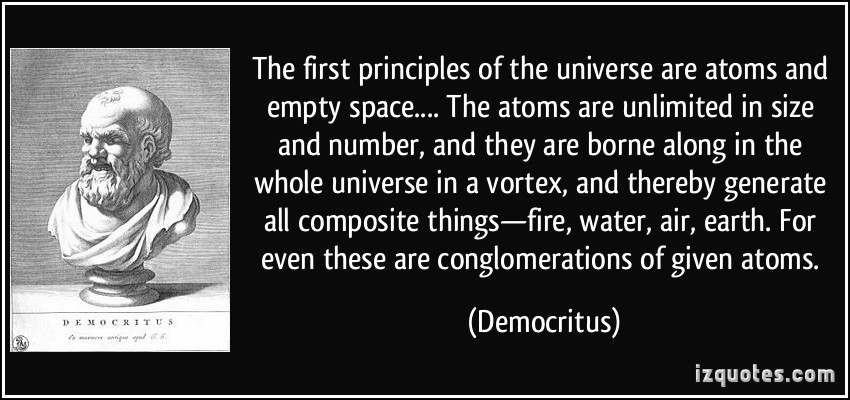
Democritus
Democritus is an ancient Greek philosopher, a follower of Levkipus and a systematizator of atomism. His philosophical principles in physics are the existence of the atom and the empty space, as well as the movement of the atoms upon which the emergence of the world and knowledge is based. There are about 60 works that deal with physics, mathematics, astronomy, ethics, music. Saved fragmentarily. Democritus was born in Abdera, Thrace. The year of birth is 460 BC. Apollodorus, who is probably more reliable than Thrasyllus, according to which he was born ten years earlier. His father was very rich. Democritus spent his inheritance to quench his thirst for knowledge. He traveled to Asia, even reached India and Ethiopia. He lived in Egypt for five years. He himself says that no one else has traveled, has seen so many countries and has not met so many scientists of himself. Also praise the knowledge of Egyptian mathematicians. After returning to his native country, he began to engage in physics. He travels to Greece to enrich his country's knowledge. He knows many Greek philosophers and mentions them in his texts, and because he is rich, he buys their texts. Leucipus, the discoverer of atomism, has the greatest influence over him. He may have known Socrates, but Palton does not mention it, and Aristotle says he is pre-Socrates. Democritus died at the age of 90, about 370 BC, but someone wrote that he lived until 104.
Hypothesis of the atom
The theory of Demokritus and Levkipus states that everything consists of "atoms" that are physically but not geometrically indivisible. There is an empty space between the atoms. They are indestructible, they have always been and will always be on the move. There is an infinite number of atoms and types of atoms that differ in shape and size. For the mass of the atom, Demokritus says: "The higher the degree of indivisibility, the heavier the atom becomes."Levkippe is considered the first to develop the theory of atomism, although Isaac Newton is rather attributed to the Phoenician Mochus (whom he regards as the biblical Moses). The Stanford Encyclopedia of Philosophy notes: "But this theologically motivated view does not seem to be supported by much historical evidence. "But his claim to the weight of the atoms is disputed. Demokritus, together with Levkip and Epicurus, offered the earliest views of the forms and possibilities of connecting the atoms. They are motivated by the fact that the solidity of the material corresponds to the shape of the bound atoms. Thus, the iron atoms are solid and strong with hooks that close them in a density; the water atoms are smooth and slippery; salt atoms because of their taste are sharp. And air atoms are light and spin, and penetrate into all other materials. Using analogies from our sensory knowledge, he gave a picture or image of an atom that differs from their shape, size, and arrangement of their parts. Besides, connections were explained by essential units in which single atoms were fitted with something attached to them: some with hooks, some with beads and nests. The atom of Demokrit is an inert solid (except for some parts of its volume) that interacts mechanically with other atoms. In contrast, modern quantum mechanical atoms interact through electric and magnetic force fields and are far from inertia. The theory of atomism seems to be consistent with that of modern science than any other theory of antiquity. However, the resemblance to modern concepts of science may be confusing when trying to understand where the hypothesis comes from. Obviously, classical atomists would never have a solid empirical basis for our modern concepts of atoms and molecules.
However, Lucretius describes the atomism in the Nature of Things and gives very clear and convincing empirical arguments to the original theory of the atom. He notes that every material is subject to irreversible decay. Over time, even hard rocks are slowly deformed by drops of water. Things have a tendency to mix: you mix water with your finger and get mud that will not otherwise be formed by itself. We see in nature and technology that there are mechanisms to recreate "clean" materials such as water, air, and metals. The conclusion is that many properties of materials must come from something inside that will never decompose - something that will keep the same intrinsic, indivisible properties forever. The main question is: why everything in the world has not yet been decomposed, and how exactly can the same materials, plants, animals be recreated again and again? An obvious decision to explain how indivisible properties can be transmitted in a way unknown to human senses is to allow the existence of "atoms". These classical "atoms" are closer to our modern concept of the "molecule" than to the atoms of modern science. The other great foundation of classical atomism is that there must be a lot of free space between these "atoms" - the empty space. Lucretius gives reasonable reasoning that the emptiness is absolutely necessary to explain how gases and fluids can change their shape, while metals can be in different forms without changing the basic properties of the material.
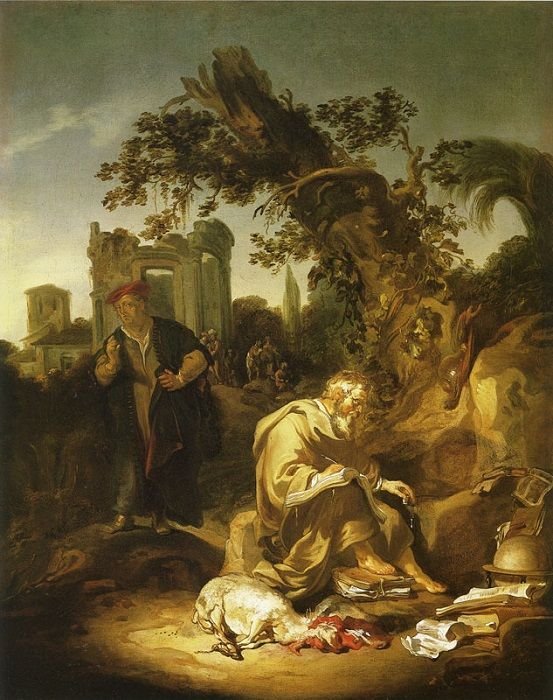
Hippocrates visiting Democritus in Abdera, by Jan van Noordt
Hypothesis of Empty Space
The atomistic hypothesis of empty space was the paradox of Parmenides and Zeno, the founders of metaphysical logic, who have difficulty pointing out arguments in favor of the notion that there can be no movement. They assumed that every movement would need an empty space that is nothing, but nothing can exist. Parmenide's position is, "You say it is a void - therefore nothing, so there is no emptiness. That is why there is no emptiness. " Parmenid's position is confirmed by the observation that when there seems to be nothing - there is air, and indeed even when there is something like light waves there. The atomists agreed that the movement required emptiness but did not pay attention to Parmenides' argument on the grounds that the movement was a fact observed. That's why they claim there should be a blank space. This idea has survived in a refined version of Newton's theory of the absolute space, which corresponds to the logical demands that reality be non-existence. Einstein's theory of relativity generates a new response to Parmenides and Zeno, with the insight that space itself is relative and can not be separated from time as part of a generally distorted space.
Epistemology
According to Democritus, knowing the truth is difficult, because perception through the senses is subjective. Likewise, different impressions come from each individual, so by sensuous impressions we can not judge the truth. We can only interpret the sensory data through the intellect and take advantage of the truth because the truth is at the bottom. There are two types of knowledge that he calls "legitimate" (gnesie: natural) and the other "bastard". Knowledge "bastard" deals with perception through the senses, therefore it is insufficient and subjective. The reason is that sensory perception is due to the emanation of atoms from the objects of the senses. When these different forms of atoms come to us, they stimulate our senses according to their form, and our sensory impressions derive from these stimuli. The second type is known as the "legal". It can be achieved through the intellect, in other words, all the sensory data from the bastard knowledge must be developed through reasoning. In this way one can escape from the false perception of bastard knowledge and understand the truth through inductive reasoning. After taking into account sensory impressions, you can look at the causes of the phenomena, make conclusions about the laws that govern the phenomena, and find the causal link to which they relate. It is a process of thought from the private to the whole or from the obvious to the uninvited (inductive reasoning). This is one example that shows why Democritus is considered an early scientific thinker. The process reminds us that science gathers its conclusions. Democritus was accustomed to saying that "he prefers to find a causal relationship rather than become a king of Persia."
Ethics and politic
Democritus ethics and politics come to us mostly in the form of maxims. As such, Stanford's philosophy encyclopedia has come to say that: "Despite the large number of ethical proverbs, it is difficult to build a coherent explanation for Democritus' ethical views and notes that it is difficult to decide which fragments are really his. He says that "Equality is everywhere exalted", but it is not comprehensive enough to include women or slaves in this respect. Poverty is better in democracy than prosperity in tyranny, similarly freedom of slavery. Those in power must lend to the poor and help and support them. When money is used meaningfully, it leads to generosity and charity, and the money that is used irreverently leads to a common cost for the whole society. Democritus says that while making money is not useless, the use of wrongful acts is now "the worst of all things. "He values ??much more wealth than independence.